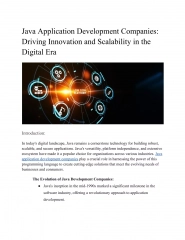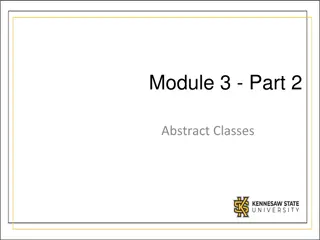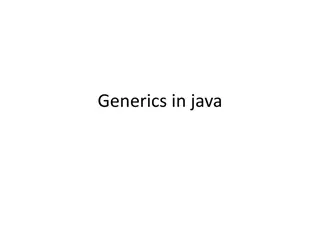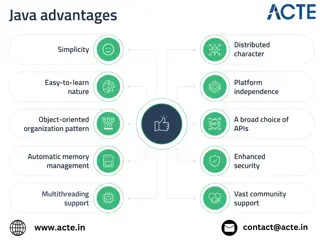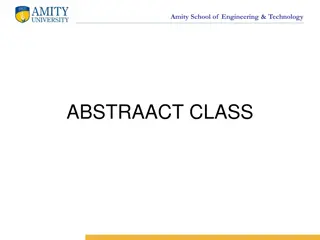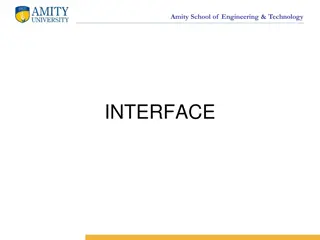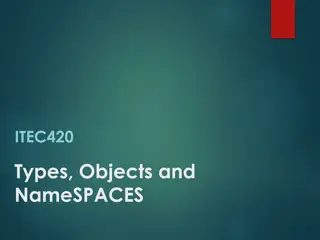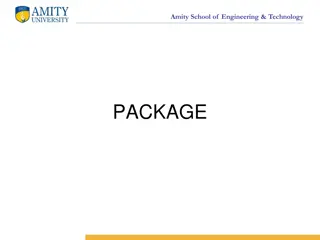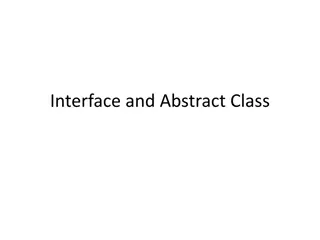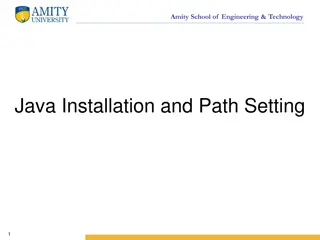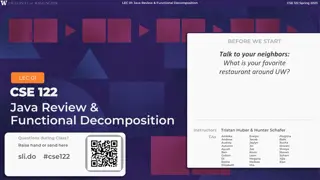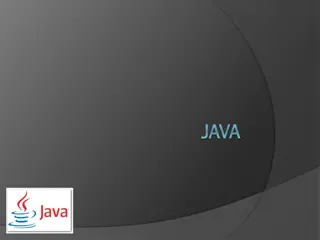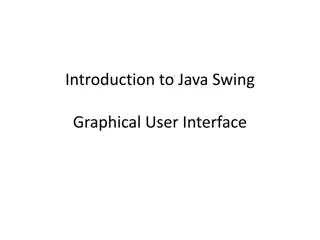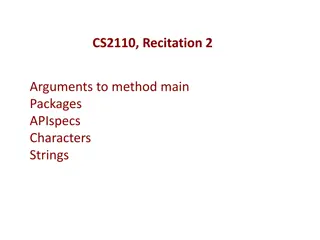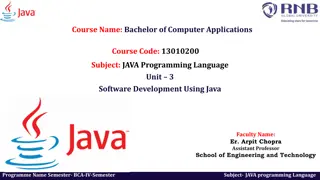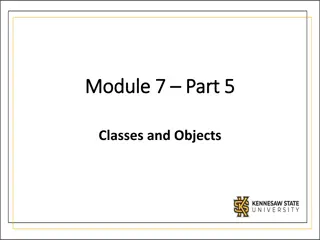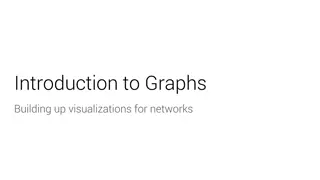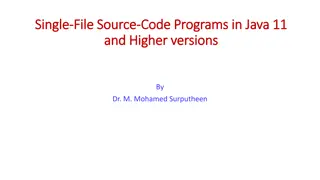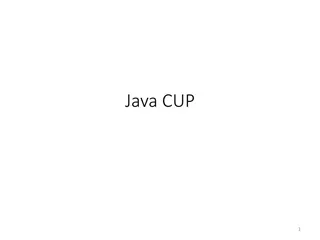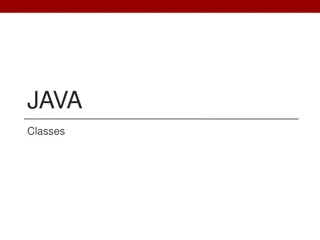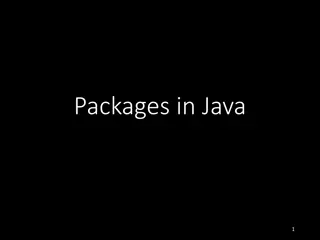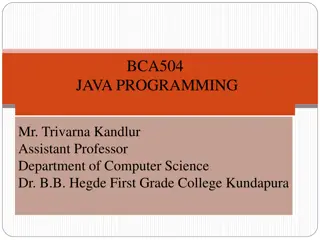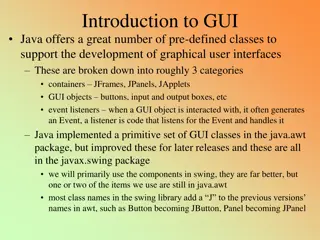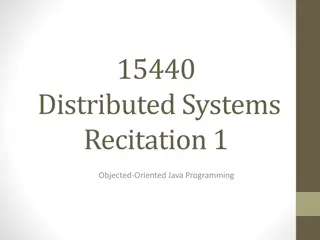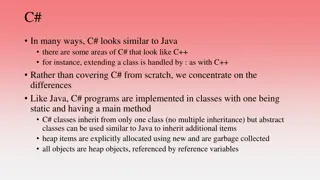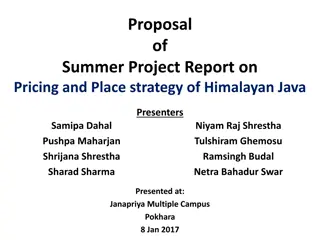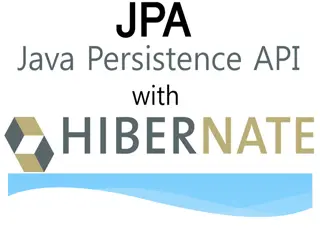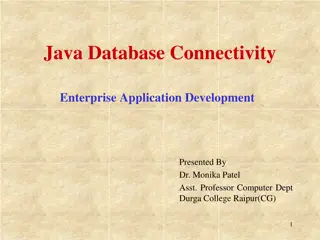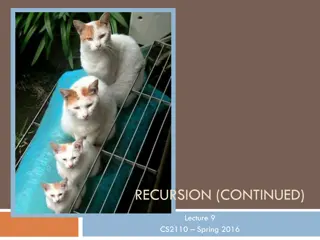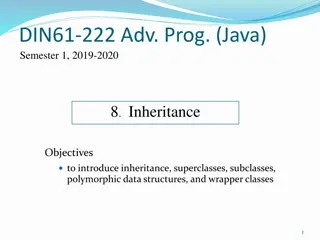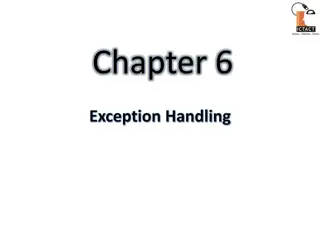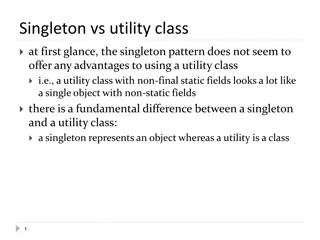Java application development company (1)
In today's digital landscape, Java remains a cornerstone technology for building robust, scalable, and secure applications. Java's versatility, platform independence, and extensive ecosystem have made it a popular choice for organizations across various industries. Java application development compa
2 views • 4 slides
Understanding Abstract Classes and Inheritance in Object-Oriented Programming
Inheritance in object-oriented programming allows for reusing proven and debugged high-quality software through abstract classes. Abstract classes serve as superclasses and cannot be instantiated, instead, they force child classes to implement specific methods. Concrete and abstract methods can coex
6 views • 15 slides
Understanding Generics in Java
Generics in Java allow for parameterized types, enabling the use of different data types in classes, interfaces, and methods. By creating generic entities, such as classes that work with various data types, Java programmers can write more flexible and reusable code. This concept is demonstrated thro
0 views • 16 slides
Understanding Java: The Backbone of Cross-Platform Development
Java stands as a cornerstone in the realm of programming languages, revered for its versatility and robustness. Enrolling in a Java Course in Pune significantly enhances one\u2019s ability to leverage Java\u2019s capabilities effectively. Understandi
1 views • 1 slides
Understanding Abstract Classes in C++ and Java
Abstract classes play a crucial role in C++ and Java programming. In C++, a class with at least one pure virtual function becomes abstract, while in Java, the 'abstract' keyword is used to define an abstract class. This article discusses the concept of abstract classes, their key characteristics, ex
0 views • 33 slides
Understanding Java Interfaces in Amity School of Engineering & Technology
Java interfaces are a key concept in object-oriented programming that allows for achieving multiple inheritance. The article discusses how Java interfaces work, their role in defining class behavior, and the differences between interfaces and classes. It also explains the syntax for declaring interf
2 views • 48 slides
Understanding Classes and Objects in Programming
In programming, classes are fundamental building blocks that define the structure and behavior of objects. Classes contain properties, methods, and events that allow interaction between objects. Objects are instances of classes, created using the `new` keyword. Classes help organize code, encapsulat
0 views • 29 slides
Understanding Java Packages and Their Importance in Programming
An exploration of Java packages, their role in structuring code, organizing classes, and enhancing code reusability. Learn about built-in and user-defined packages, the Java API's package organization, and the different types of packages available in Java programming. Discover how packages help in c
2 views • 18 slides
Understanding Interfaces and Abstract Classes in Java
Interfaces and abstract classes play a crucial role in Java programming by defining contracts and blueprints for classes to implement. Interfaces provide a way for classes to declare their capabilities, while abstract classes allow for partial implementation. This article explains the concepts of in
1 views • 19 slides
Amity School of Engineering & Technology Java Installation Guide
In this detailed guide provided by Amity School of Engineering & Technology, learn how to install and set up Java on your system effectively. The step-by-step instructions cover downloading the Java installer, configuring the installation wizard, setting environmental variables, and more to ensure a
1 views • 19 slides
Best Hip Hop Dance Classes in Birrong
Are you looking for the Best Hip Hop Dance Classes in Birrong? Then contact Mz Dinaz Dance Studio. They offer dance classes such as hip-hop dance classes, ballet classes, kids dance classes, jazz, acrobatics, musical theatre, and more. With the help
0 views • 6 slides
Java Review & Functional Decomposition in CSE 122 Spring 2023
Lecture 01 in CSE 122 covers Java review, functional decomposition, and code quality. Announcements include a Java review session, programming assignments, and reminders on Java syntax. The session encourages active participation through in-class activities using Slido polls. Students are also urged
0 views • 24 slides
Understanding Interactive Programs and Input/Output in Java
Interactive programs in Java allow users to input data through the console, which can be captured and used in the program. This involves using the Scanner class to read user input, and understanding common Scanner methods to process different types of input. Importing Java class libraries is essenti
2 views • 15 slides
Learning Swing with Java Foundation Classes (JFC) and Swing
Java Foundation Classes (JFC) and Swing provide a powerful set of tools for building graphical user interfaces in Java applications. This includes Swing GUI components, pluggable look-and-feel support, accessibility APIs, Java 2D graphics, and internationalization capabilities. By learning Swing wit
1 views • 11 slides
Understanding Java Swing for Building Graphical User Interfaces
Java Swing is a powerful framework for creating graphical user interface applications in Java. It provides a wide array of visual components such as JFrame, JComponent, and JPanel, enabling developers to build interactive and visually appealing applications easily. With Swing, developers can design
1 views • 25 slides
Java Application Development Basics
Learn how to create a Java application with a main method using Eclipse. Understand the concept of method parameters and how to provide arguments when running the application through Eclipse's Run Configurations feature. Explore the structure of packages in Java and the Java API.
0 views • 26 slides
Understanding Java Programming: BCA IV Semester Course Overview
This Bachelor of Computer Applications (BCA) course focuses on Java programming language fundamentals, object-oriented concepts, software development principles, and practical application skills. Students will learn to define Java program features, implement object-oriented features, work with array
0 views • 31 slides
Understanding Classes and Objects in Python and Java
Python and Java both utilize classes and objects in their programming paradigms. While there are syntax differences, the fundamental concepts remain similar. Fields and constructors are key components in defining classes, with Python using shared fields until assignments are made and Java focusing o
1 views • 6 slides
Exploring Graphs: Visualizations and Representations in Java
Delve into the world of graphs with a focus on visualizations for networks and building up graph representations in Java. Explore different graph representations, adjacency lists, and key-value mappings, along with insights on storing and tracking data efficiently using Java data structures. Dive in
0 views • 12 slides
Understanding Single-File Source Code Programs in Java 11
Explore the concept of single-file source code programs in Java 11, where the entire program is contained within a single .java file without external dependencies. Learn how to compile and run these programs both before and after Java 11, and discover the new feature of executing Java programs direc
0 views • 11 slides
Understanding Java CUP Parser Generators
Explore the world of Java CUP parser generators, focusing on creating Abstract Syntax Trees (ASTs), translating lists in context-free grammar, and the use of parser tools like YACC and Java CUP. Dive into creating grammars, token classes, and AST classes to build parsers effectively.
0 views • 15 slides
Understanding Scanner Class in Java: Reading User Input and Processing Files
The Scanner class in Java's java.util package allows reading input from the keyboard or files. It looks for tokens in the input, reads different types of values, and has methods like nextInt() and nextLine(). You can also read from files by creating a File object. Learn how to use Scanner to interac
0 views • 21 slides
Understanding Classes and Objects in Java Programming
Explore the fundamentals of Java classes and objects, including defining classes, instance variables, methods, constructors, accessors, mutators, static vs instance members, creating and calling methods, encapsulation, object-oriented design principles, and designing custom classes for specific task
0 views • 26 slides
Understanding Packages in Java: A Comprehensive Overview
Packages in Java play a crucial role in organizing and structuring code for efficient reuse and maintenance. They allow you to group related classes together, provide encapsulation, and facilitate code organization. This article dives into the basics of Java packages, advantages they offer, differen
0 views • 19 slides
Introduction to Java Programming: Basics and Applications
Java, developed by James Gosling, is a versatile object-oriented programming language used for mobile, desktop, web applications, servers, games, and more. It is renowned for its platform independence, popularity, ease of use, security, and strong community support. This subject delves into Java fun
0 views • 15 slides
Understanding Interfaces and Classes in Java
Explore the concept of interfaces and classes in Java programming. Learn about defining methods in interfaces, implementing interfaces in classes, and the relationship between classes and interfaces. Discover how interfaces can be used to define a common set of methods that classes must implement, l
0 views • 25 slides
Java Overview and Basics: Understanding the Fundamentals of Java Programming
Java is a versatile programming language known for its simplicity, security, portability, and high performance. Its history dates back to 1990 when the concept was first suggested, leading to the creation of Java in 1995 by James Gosling. Over the years, Java has evolved with various versions introd
0 views • 65 slides
Overview of Java Programming Language
Java is a versatile and powerful programming language created by James Gosling and others at Sun Microsystems in the 1990s. It aims for portability, reliability, safety, simplicity, and efficiency. With a strong focus on object-oriented programming, Java has evolved over the years with a rich histor
0 views • 33 slides
Mastering Generics in Effective Java: A Practical Guide for Java Programmers
Explore the world of generics in Java through Joshua Bloch's guidance in "Effective Java". Learn the importance of avoiding raw types, leveraging parameterized types for type safety, handling mixing of generic and raw types, and implementing wildcards for flexible and typesafe coding. Enhance your J
0 views • 30 slides
Understanding Abstract Classes and Inheritance in Java
Explore how to utilize abstract classes and inheritance in Java programming to share common code across classes. Learn through examples involving animals like Dillo and Boa, and discover the concept of creating helper methods and abstract classes to abstract common features efficiently.
0 views • 31 slides
Overview of GUI Components and Creating GUI in Java
In Java, GUI development is facilitated by a variety of pre-defined classes categorized into containers like JFrames and JPanels, GUI objects such as buttons and input boxes, along with event listeners for user interactions. The javax.swing package offers enhanced GUI classes compared to java.awt. K
0 views • 17 slides
Understanding Object-Oriented Java Programming Concepts
Explore the fundamentals of object-oriented programming in Java, covering topics such as user-defined classes, inheritance, polymorphism, abstract classes, and interfaces. Learn about packages, encapsulation, access modifiers, overloading methods, and more to enhance your Java programming skills.
0 views • 17 slides
Differences Between C# and Java: A Comparative Overview
C# and Java share similarities in syntax and features, but there are key distinctions that set them apart. From class inheritance to memory management, this comparison highlights the unique aspects of C# programming. Explore how C# diverges from Java in terms of multiple inheritance, explicit heap a
0 views • 16 slides
Study on Pricing and Place Strategy of Himalayan Java Coffee: A Detailed Analysis
This report delves into the pricing and place strategies of Himalayan Java coffee, focusing on factors influencing coffee pricing and selection of outlet locations. The study aims to identify the target market, understand competitive dynamics, and analyze factors impacting coffee sales at Himalayan
0 views • 10 slides
Understanding Java Persistence API (JPA) for Data Management in Java Applications
Java Persistence API (JPA) is a specification that provides a framework for managing relational data in Java applications. It simplifies ORM solutions, offers vendor independence, and supports test-driven development with annotation-driven mapping.
0 views • 31 slides
Introduction to Java Database Connectivity (JDBC) in Enterprise Application Development
JDBC, or Java Database Connectivity, is a vital technology in enterprise application development that provides a standardized library for Java programs to connect to databases via SQL commands. It abstracts vendor-specific details, making connectivity to multiple databases seamless. JDBC API standar
0 views • 13 slides
Understanding Recursion in Java: CS2110 Lecture Overview
This content delves into the concept of recursion in the context of Java programming as discussed in the CS2110 Spring 2016 lecture series. It covers the basics of recursion, including base cases and how Java stack frames operate. The material also includes solutions to exception-handling problems a
0 views • 21 slides
Introduction to Inheritance and Polymorphism in Java Programming
This course material covers the concepts of inheritance, superclasses, subclasses, polymorphic data structures, and wrapper classes in Java programming. It introduces the DoME example - a multimedia entertainment database, showcasing the implementation of classes like CD and DVD. The details of CD a
0 views • 54 slides
Exception Handling in Java: Understanding Errors and Exceptions
Exception handling in Java is crucial for dealing with errors and exceptions that can occur during program execution. Errors and exceptions are conditions that disrupt the normal flow of a program, and understanding their differences is key to effective error management. This chapter covers the conc
0 views • 32 slides
- Java Design Patterns: Singleton vs Utility Classes
- Singleton and utility classes in Java have distinct differences despite superficial similarities. Singleton represents an object, while utility is a class. Singleton can implement interfaces freely, allow static methods in Java 8 interfaces, and convert to non-singleton. In contrast, utility class
0 views • 29 slides
